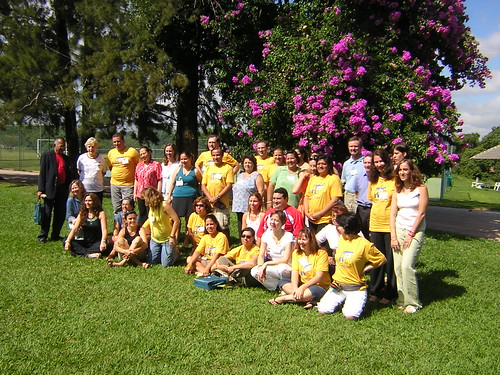–
I drove to the hotel early this morning (it´s only 45 minutes away from my country house) to be here at the opening session. All participants arrived here yesterday.
It´s a very nice group composed of 29 participants (18 from different places all over Brasil and 11 from other Latin American countries: Argentina, Chile, Peru, Venezuela and Cuba), 3 tutors: Vanessa Andreotti, David Shepherd and Sarah Walker and 1 course director, Margit Szesztay. After a plentiful breakfast, Margit, Mike Thornton, British Council representative in Brazil, and the tutors mapped out the week. A few warm up activities made participants interact and know each other better.
Vanessa asked us to draw a suitcase, putting inside what he had brought to the course and outside what we had left behind. These drawings were shared in groups. During break time we went out for some photographs. I have taken some individual pictures of participants who do not have their own photos online for the blogging session tomorrow so that they can place their faces on our Summerschool Frappr Map.
We are now discussing “English as a Global Language: different perspectives”. Margit projected a quote by David Crystal ” Nobody owns English now”
Some participants reacted against the concept of “ownership” and feel that nobody owns a language. They illustrated their argument with examples of different varieties of Spanish spoken in Latin America and that there is no correct variety. Sarah (native speaker) mentioned how the perspective towards English changed in the past 40 years. When she started, she considered it very much her own language and taught all the cultural aspects associated to it (example: double decker buses), while now she does not have the impression of owning anymore. For David (native speaker from the Notheast of England ), having to teach RP felt like teaching a second language as he did feel he owned this particular variety.
Several participants read extracts from an Internet interview with David Crystal, during which teachers from all over the world bring forward questions on what the appropriate uses of the language should be.
Triggered by these examples, some of the points that were brought up in the group discussion in this room were whether some forms are more correct than others, whether other local varieties of English should be corrected, what should be considered a mistake, what should be corrected and if a standard and models should be established.
Other questions that came up were evaluation, the nature of the English language (widespread and spoken by so many different people) and what could be considered a natural use of the language – the role of accuracy. One participant mentioned the importance of adapting the language and behaviour to the local context so as to make yourself better understood. Shaun mentioned native speakers like himself sometimes have more difficulty in adapting to other contexts than non-natives.
Break for lunch 🙂
